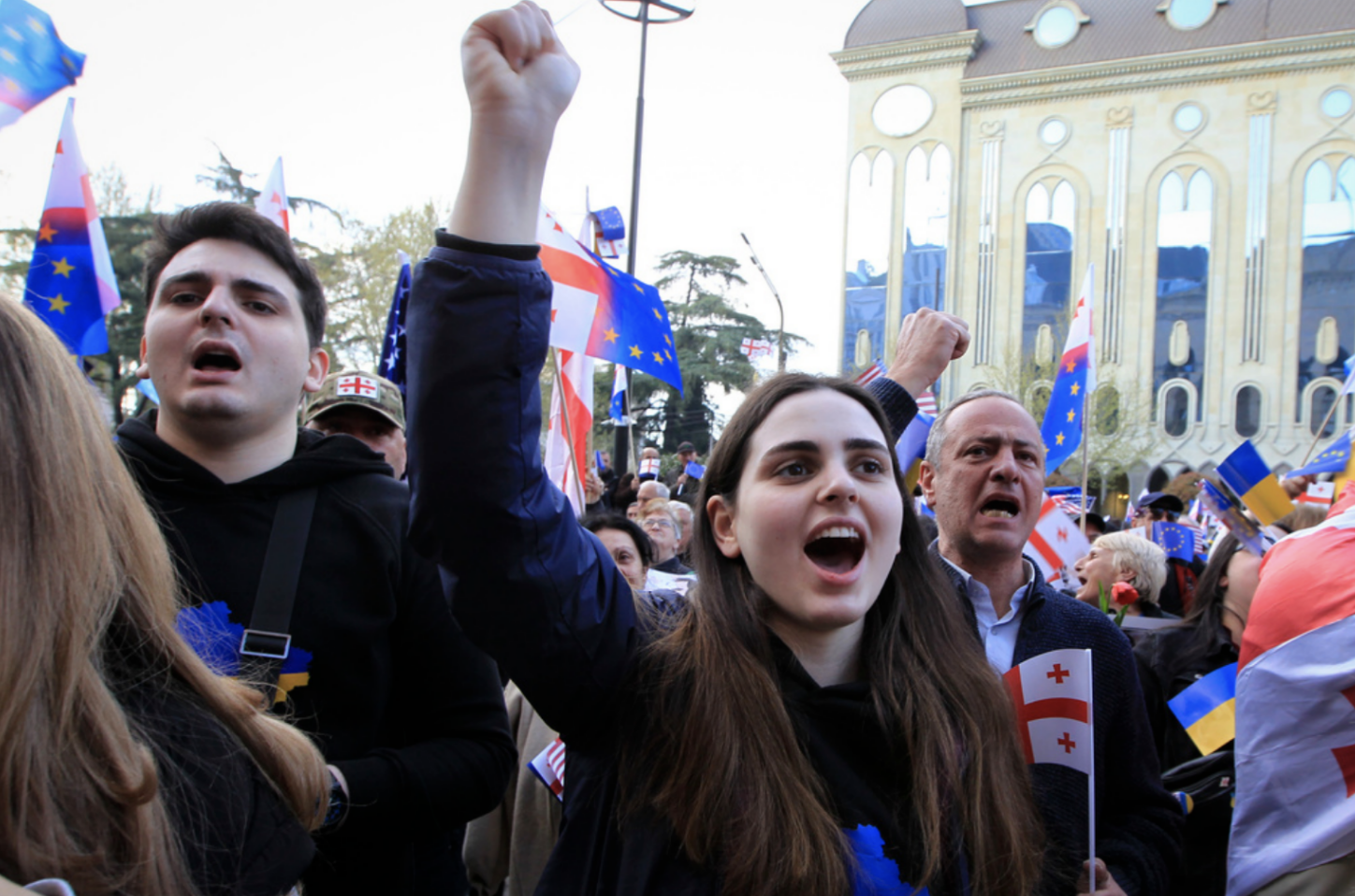Protests in Tbilisi Against Pro-Russian Georgian Government
Demonstrators at the rally of Georgian opposition parties shouting slogans in support of the country's membership in the European Union and release of former Georgian President Mikheil Saakashvili from custody on April 9, in Tbilisi, Georgia. Photo: Shakh Aivazov/AP
On April 9, thousands of opposition supporters gathered outside the Georgian parliament in Tbilisi in an attempt to express their dissatisfaction with the policies of the government, which are described to be pro-Russian and authoritarian.
The rally was organized under the slogan “Together for Europe” by the main opposition group, the United National Movement (UNM), founded by the jailed former President Mikheil Saakashvili. He is serving a six-year prison sentence for exceeding his authority as president of the country in 2004 to 2013. The UNM and international human rights groups have condemned the sentence as politically motivated, and protests have been held in Georgia ever since.
The opposition accuses the government of the ruling Georgian Dream party of imprisoning opponents, silencing independent media, and secretly collaborating with the Kremlin. Protesters also expressed support for Ukraine and for Georgia's aspirations to join the European Union; they waved Georgian, Ukrainian and European Union flags and held a huge banner with the inscription "For a European Future.”
Releasing political prisoners and implementing reforms is one of the June 2022 European Union's requirements for granting Georgia official candidate status. Georgia applied for membership alongside Ukraine and Moldova a few days after Russia's full-scale invasion of Ukraine. EU leaders granted official candidate status to Kyiv and Chisinau in June, but rejected Tbilisi, claiming that they must carry out reforms first.
The Georgian government “is controlled from Moscow, and it is our duty to save our homeland from Russian statues,” former Georgian President George Margvelashvili told in the rally. “We are a freedom-loving people, part of the European family. We reject Russian slavery.”
“Our fight will be peaceful but uncompromising and will lead us to where we belong, the European Union,” a 27-year-old painter Luka Kavsadze told the AFP news agency
Protesters wave Ukrainian, Georgian and EU flags, as they rally outside the Georgian parliament building on March 8 in Tbilisi, Georgia. Photo:Zurab Tsertsvadze/AP
Under pressure from mass protests in March, the ruling Georgian Dream Party withdrew the controversial draft law that classified any nongovernmental organizations and media outlets that receive more than 20 percent of their funding from abroad, as “foreign agents.” Opponents of the law said it was modeled on one that was passed in Russia in 2012 to stifle dissent, and called it a step toward authoritarianism. Armaz Akhvlediani, an independent opposition member of parliament and former secretary-general of the Georgian Dream, stressed that the government had "Russian interests" that worked against "democracy and rule of law. In the protests, police used water cannons and pepper spray against the demonstrators.
However, Prime Minister Irakli Garibashvili had earlier condemned the "hype" surrounding the draft law. His party argued that the legislation mimicked American laws of the 1930s. The Kremlin used a similar argument when it passed the law on foreign agents. In response to the March protests, Kremlin spokesman Dmitry Peskov said that Russia had "absolutely nothing" to do with it, trying to distance his country from the protests.
"Nothing there was inspired by the Kremlin. The Kremlin had absolutely nothing to do with it. The practice of introducing such laws - the pioneer here was the United States in the late 1930s," he said.
Peskov pointed out that one version of the Georgian law "was very much like a similar [American] law," while the other was "softer in its essence.” Moscow had nothing to do with both versions, he said.


